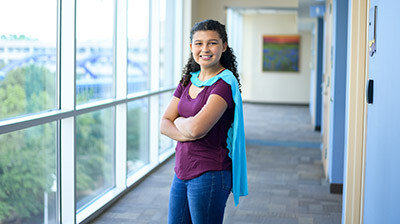
Emma
Clinical research helps Emma today and others tomorrow
Shantel Brisendine’s husband was deployed in Iraq when she went into labor with their first child. Almost immediately after baby Emma was born, doctors suspected that she had a rare condition called Congenital Adrenal Hyperplasia (CAH). They quickly referred mother and daughter to Children’s Health℠ in Dallas, one of only eight hospitals in the nation designated as a Center of Excellence for this serious hereditary condition.
At Children’s Health, Shantel attended a three-hour crash course about CAH where she learned how the condition could impact her daughter and the ongoing care Emma would need.
CAH hinders the body’s ability to make three essential hormones – cortisol, aldosterone and androgens – that manage important bodily functions and impact how a child grows and develops. People with CAH, like Emma, require daily medication to replace the hormones that enable their bodies to work properly.
The whole thing was a bit overwhelming, but the care and information we received at Children’s Health helped us understand what Emma would need to be healthy.
— Shantel, Emma's mother
Ongoing care makes the difference
Thanks to her daily medications, Emma, now 15, lives a pretty typical life. Her eclectic interests range from making soap and bath bombs to reading and archery. She enjoys participating in the Model UN program at school and plans to be a lawyer who focuses on social justice issues when she grows up.

Yet even with ongoing care, Emma and her family must remain vigilant about her health and her surroundings. Because people with CAH are not able to retain the salt their bodies need to hold and balance fluids, even enjoying a hot summer day is tempered by concerns about dehydration. An injury, illness or even too much enthusiasm can cause a hormonal surge that requires emergency medical attention.
“When I was younger, I’d get sick on my birthday a lot because I’d get super energetic and my body would release too much adrenaline,” Emma said.
And, while the powerful medications she takes every day enable her to enjoy a full, well-rounded life, they have their drawbacks. For example, taking high levels of hydrocortisone can suppress growth and make it hard to control weight.
“Short stature is common for people with CAH. We’ve always hoped Emma would make it to 5 feet tall. But as she was starting puberty, her doctors predicted she’d only be 4’10” or so,” her mom said. “Then they told us about a new research study.”
Clinical research: the chance to see – and make – a difference
Doctors at Children’s Health were starting a clinical research study based out of the endocrinology department to see if the medicine Crinecerfont could allow patients with CAH to safely lower the amount of hydrocortisone they needed and still maintain overall balance of hormones.
The Brisendines jumped at the invitation to participate, seeing the study as an opportunity to help Emma in the short run and improve treatment for others in the long run.
“Emma wouldn’t have had the excellent care she’s had without the patients who participated in research studies before her,” Shantel said. “This was our opportunity to help the people who will come next.”

Emma was the first patient to be approved for the study, which was organized into two groups – one that would be trying the new medication and one that would continue with the current standard treatment. The family wasn’t told which group Emma would be in, but it wasn’t long before they noticed clues.
“We saw an almost immediate change in her growth and height, and pretty soon we were allowed to lower her dosage of hydrocortisone because her levels were balancing out better,” Shantel said.
During the study, Emma took daily medication and attended an all-day clinic every other month for a checkup, an EKG to observe her heart rhythm and lab work to check her hormone levels. She also answered a questionnaire about how she was feeling on the medications. Emma completed her year in the study in May 2023 and she remains on the study’s medication protocol. She’s already 5’1” tall – and still growing.
“I was a little nervous at first about changing medications, but I felt it was important to try,” Emma said. “I hope the study shows that the medicine works and that other people with CAH can use it. And, of course, that I can keep using it, too.”
The Brisendines felt strongly about participating in a clinical study because they wanted to give back to the medical community for the care and support they had received over the years. But it was their trust in the providers at Children’s Health that made it easy for them to say ‘yes’ when the opportunity arose.
We feel safe and cared for at Children’s Health, and the advances made by clinical research are so important, why wouldn’t we do something that helps more people thrive?
— Shantel, Emma's mother
Meet more Children's Health patients
Read more patient stories like Emma's and meet our Patient Ambassadors to learn how Children's Health makes life better for children.
Kids count on us. We count on you.
Give to support innovative research, lifesaving treatments and compassionate care.
Did you enjoy this story?
If you would like to receive an email when new stories like this one are posted to our website, please complete the form below. We won't share your information, and you can unsubscribe any time.

